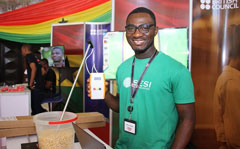September 18, 2020
Feed the Future Post-Harvest Loss Innovation Lab in the spotlight

The USAID-funded Feed the Future Innovation Lab for the Reduction of Post-Harvest Loss, or PHLIL, at K-State has a number of notable highlights to share from Feed the Future Week, which took place Sept. 14-18.
A decade ago in 2010, Feed the Future was established as the U.S. government's research response to a global food crisis. In these last 10 years, partners around the globe and in U.S.-based universities have united to target the root causes of poverty and hunger. K-State is home to four of the 20 national Feed the Future Innovation Labs.
To kick off its decennial, a new Feed the Future webpage was rolled out, highlighting inspiring partners who are cultivating hope and igniting change in the face of adversity.
Isaac Sesi, a young entrepreneur from Ghana and PHLIL program partner, is featured in the Transforming Agriculture section of the new Feed the Future Cultivators of Hope website. Sesi became the CEO of Sesi Technologies shortly after graduating with his Bachelor of Science from KNUST in Ghana. Today, Sesi Technologies provides farmers with an affordable, effective tool: the GrainMate moisture meter to tackle the issue of lack of proper drying and storage for grains. Sesi has won several awards recently, including being named one of MIT Technology Review's global 35 Innovators Under 35 in 2019.
You can hear Sesi speak on resilience and perseverance at a Global Food Systems virtual event in conjunction with the 2020 K-State First Book at noon CDT Thursday, Oct. 1.
PHLIL was also featured at the Feed the Future Innovation Labs' annual meeting this week, as the lab was selected to participate in both the $1 million Innovation to Impact (i2i) project led by the Soybean Innovation Lab at the University of Illinois and facilitated by K-State's agricultural economics professor Vincent Amanor-Boadu, as well as the Scientific Animations Without Borders (SAWBO) RAPID grant led by the Legume Systems Innovation Lab at Michigan State University. Both of these projects will help to elevate the knowledge and scale of postharvest loss technologies and innovators in PHLIL's current partner countries of Bangladesh, Ethiopia, Ghana and beyond.
In addition to these Feed the Future week highlights, the Post-Harvest Loss Innovation Lab was highlighted last week in the national Bangladeshi press after the PHLIL Bangladesh team hosted an annual meeting on Sept. 9 touting the successes of the innovative BAU-STR grain dryer. The dryer's suitability and local production have drawn national attention. As keynote speaker, Secretary Md. Nasiruzzaman stated that the BAU-STR dryer and hermetic bags have proven to be effective technologies in reducing postharvest loss for grains in Bangladesh and need to be expanded and introduced to more farmers. The BAU-STR dryer is beginning to scale, for the benefit of smallholder rice farmers across the country. A new government subsidy in Bangladesh will support their local farmers in the purchase of up to 5,000 additional dryers in the next five years.
The PHLIL program continues to expand its collaborations and projects, within K-State, across the U.S. and around the world. The PHLIL team has great ambitions to secure a safe and lucrative harvest from Kansas to Kathmandu.
